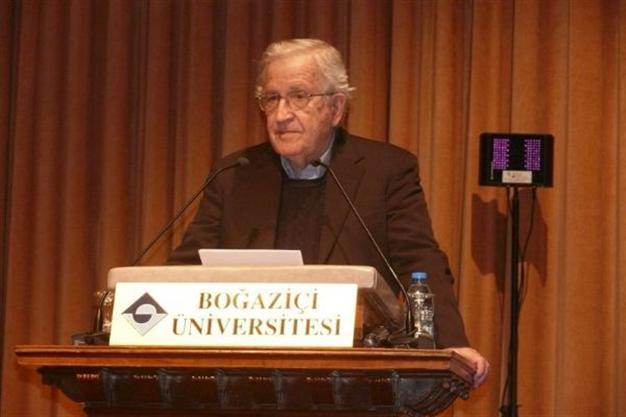Chomsky accuses Turkish daily of fabricating parts of interview
ISTANBUL - Hürriyet Daily News

American linguist, philosopher and political activist Noam Chomsky has accused Turkish daily Yeni Şafak of publishing an interview with himself containing fabricated remarks that he did not state about recent incidents in Egypt. DHA photo
American linguist, philosopher and political activist Noam Chomsky has accused Turkish daily Yeni Şafak of publishing an interview with himself containing fabricated remarks that he did not state about recent incidents in Egypt.To back up his claims, Chomsky published the original version of the questions and answers of the email interview with the reporter, Burcu Bulut. Yeni Şafak’s published interview and the philosopher’s website version are quite different in content.
“Chomsky.info would like to let readers know that an interview with Professor Chomsky published by Turkish newspaper Yeni Şafak on Aug. 26 contains fabrications and is not an accurate or faithful translation of Professor Chomsky’s written responses to questions he was emailed for the interview,” a post said on Chomsky’s official Facebook page today.
“How does it make you feel for unarmed people to be killed this way?” the daily said it asked Chomsky.
“Those who did it and those who made them do it will pay a bitter price. Those who remain silent against brutality will not see a happy end, just like those who commit such brutality,” Chomsky was quoted as saying by Yeni Şafak.
However, in the original text Chomsky published, there was no such question or answer.
Chomsky's webside reacts
Chomsky’s website also said a question included in the Yeni Şafak piece, “Could it be another reason for Western states to fear rising Muslim countries?” was not actually included in the interview.
Chomsky was quoted as saying, “Yes, this is the most important reason” on the supposed question.
“Turkey stood with the oppressed people in Syria and Egypt cases, in which unarmed, civilian people were victims. Turkey is a country that has suffered from coups and dictators,” Chomsky was quoted as saying on a question about Turkey’s Middle East policy.
The original answer, however, was quite different, according to the academic’s website.
“Erdoğan harshly condemned the coup and voiced strong support for the Muslim Brotherhood. And in Syria, he has been supporting the highly fragmented and complex rebel opposition. In both cases, I think more nuanced approaches are appropriate,” he said.
The daily also reported that Chomsky said, “The West does not want to see powerful countries that have adopted democracy.”
“Do you think this chaos in the Middle East worries Western states; on the contrary, when everything goes well, then the West becomes alarmed and as I see, their plan has worked,” he was quoted as saying.
In another exchange about Israel, the daily quoted Chomsky as saying: “We know that Israel has a huge sympathy for the Egyptian army, and we know that they meet frequently, we have heard. But there is no proof that Israel is behind the coup; at least I am not a witness to it.”
Chomsky, however, subsequently said he had answered, “Israel did not hide its sympathy for the military coup, but I know of no evidence of significant cooperation.”
Bulut defends herself
Bulut said the interview was the outcome of a long mailing process and that she was saddened by reports that her interview included fabricated sections.
“The raw material of our interview is not that. I have sent an email to Chomsky about the issue,” she said.
Bulut told T24 website on Aug. 30 that she had sent two emails to Chomsky and combined them, while Chomsky’s website only published the first part of the written interviews.
“The interviews conducted in English can be broadened by being loyal to the content. That is to say, it is not written as a simultaneous translation. Otherwise, everyone who can do simultaneous translation would be able to conduct interviews,” said Bulut, in an apparent explanation of her additions to the interview.
















